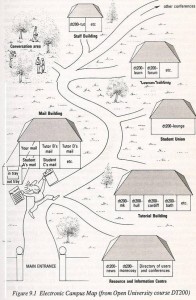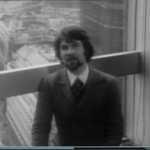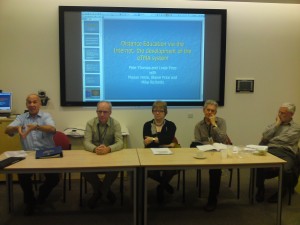Open to methods
 The final session of Opening Up The Open University, chaired by former Scottish Director Mr Peter Syme, focussed on the University’s openness to methods.
The final session of Opening Up The Open University, chaired by former Scottish Director Mr Peter Syme, focussed on the University’s openness to methods.
The first speaker was Professor of Telematics Chris Bissell who gave a whistle-stop tour of the development of home computing and computer-mediated communication at the OU. Prof Bissell pointed out that, as you would expect, the OU had always been ahead of the game when it came to using computers. Its national computer network was established in 1971 with three minicomputers in Newcastle, Walton Hall and the London Regional Office and students could log on at local study centres. Soon early computers were included as part of Home Experiment Kits. Computer-mediated communication was first experimented with in the mid-80s and the technology foundation course required a PC from 1989 onwards. The popularity of these innovative courses was always huge and therefore significant efforts had to be made to train sufficient tutors. Prof Bissell concluded by asking whether these developments had fundamentally changed the teaching model, or indeed whether they should have done.
The second speaker was Dr Allan Jones also of the Faculty of Maths, Computing and Technology, who gave a presentation on adult education at the BBC. The presentation neatly illustrated the centrality of educational programming in the BBC’s early years under Lord Reith, and how this had provided a basis for the relationship with the newly formed OU. Dr Jones pointed out that the OU and the BBC had a role in common – a public service mission to provide to the masses what had previously been the preserve of the few. He pointed out, however, that while the relationship with the BBC was crucial, focussing on it too much should not be to the detriment of recognising the contribution of staff in other non-academic units to the University’s history.
 Prof Anne Laurence, Head of History, treated attendees to clips of the OU’s first professor of history Arthur Marwick (and others) covering several years of course materials. This was an entertaining way of illustrating not only how technology had changed but how the materials reflected not only changing views of pedagogy, but the development of broadcasting more widely. It was interesting to note that even in the early days of the OU, access to technology was an issue for discussion – BBC2 could not be received throughout the whole country and colour TVs were not the norm.
Prof Anne Laurence, Head of History, treated attendees to clips of the OU’s first professor of history Arthur Marwick (and others) covering several years of course materials. This was an entertaining way of illustrating not only how technology had changed but how the materials reflected not only changing views of pedagogy, but the development of broadcasting more widely. It was interesting to note that even in the early days of the OU, access to technology was an issue for discussion – BBC2 could not be received throughout the whole country and colour TVs were not the norm.
Finally, former Dean of MCT Pete Thomas, in his presentation on the introduction of the eTMA system gave a taster of some of the historic debates that have taken place at the University in relation to assessment. Dr Thomas pointed out that throughout the University’s history, the issue of funding had always been a driving force and touched on a point raised in several contributions – that one of the unique aspects of the OU was the sheer scale and volume on which activities had to be organised.
A lively discussion followed, with reflections on the connection between developing technology and changing views of pedagogy; the evolution of the relationship with the BBC; and the historic contribution of residential schools to the OU.
Dr Dan Weinbren, Research Fellow for the History of the OU project, summed up the day by expressing great thanks to all those who had made a contribution, stressing the usefulness to the project of hearing different perspectives on the University’s history and encouraging those present to stay in touch and contribute to the blog and soon to be launched website.